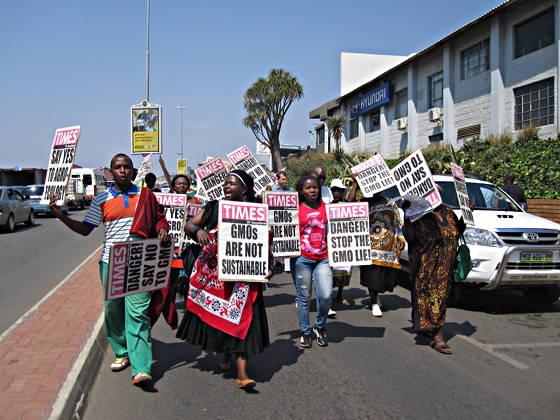Latest Resources

10 September 2018
Report from SADC regional farmer speak out on farm input subsidy programmes
Rural Women’s Assembly (RWA) and African Centre for Biodiversity (ACB) jointly hosted a meeting of farmers and civil society organisations (CSOs) in August 2018 to share views and experiences on farm input subsidy programmes (FISPs) and public sector support for agroecology in the region. About 140 participants from Namibia, South Africa, Zimbabwe, Mozambique, Zambia, Malawi, […]

18 October 2017
The GMO crisis in Swaziland
Swaziland is under enormous pressure to introduce genetically modified organisms (GMOs) into the country’s farming system. This pressure is coming not only from Monsanto but also from farmers and some sections of the public who have been fed a great deal of misinformation and hype by the pro-biotech machinery. The farmers, acting on incomplete and […]

18 February 2016
Open letter to UPOV and FAO on the new intellectual property and seed laws in Africa, Asia and La...
The African Centre for Biodiversity, the Network for a GE Free Latin America and JINUKUN – COPAGEN, on behalf of the organisers of a South – South dialogue on intellectual property (IP) and seed laws, want to bring to your attention the declaration that resulted from the Dialogue. This Dialogue was attended by several organisations […]

12 May 2015
CAGJ Media Round-up
CAGJ Media Round-up March 23, 2015 Seattle and London Actions Protesting Seed Privatisation Meeting in London On March 23, 2015 the Bill and Melinda Gates Foundation (BMGF) and the United States Agency for International Development (USAID) sponsored a secret meeting in London to promote a recent report they commissioned detailing in clear terms how to […]

8 October 2014
Acquisition of Africa’s SeedCo by Monsanto, Groupe Limagrain: Neo-colonial occupation of Af...
The Alliance for Food Sovereignty in Africa (AFSA) is deeply concerned about the recent acquisitions by multi-national seed companies of large parts of SeedCo, one of Africa’s largest home-grown seed companies. Attracting foreign investment from the world?s largest seed companies, most of who got to their current dominant positions by devouring national seed companies and […]

16 April 2013
Maíz transgénico de Sudáfrica: imposición en México y Zimbawe
BOLETÍN DE PRENSA Grupo ETC, Centro Africano para la Bioseguridad, FoodMattersZimbabwe y CTDT El Centro Africano para la Bioseguridad (ACB, African Center for Biosafety) manifiesta su alarma ante el hecho de que las autoridades sudafricanas dieron luz verde a la exportación de más de 25 mil toneladas de maíz transgénico hacia Zimbawe. Es la primera […]

15 April 2013
South Africa exports unapproved. GM maize to Zimbabwe, continues to export to Mexico, contaminati...
The ACB is deeply concerned by the news that the South African GMO authorities have permitted over 25,000 tons of GM maize to be exported to Zimbabwe. This is the first time that South African GM maize grains have been commercially exported to our neighbor north of the Limpopo, and adds to a growing list […]

25 February 2013
GM Industry Called to Account: ISAAA’s report mischievous and erroneous
The Africa Centre for Biosafety (ACB) has dismissed the findings of the biotechnology industry’s flagship annual report, published by the GM industry funded ‘NGO’, the International Service for the Acquisition of Agri-biotech Applications (ISAAA), as mischievous and erroneous. According to the report, South Africa’s GM crop area increased by a record 26% or 600,000 hectares […]

9 March 2011
How US sorghum seed distributions undermine the FAO Plant Treaty’s Multilateral System
New data from ICRISAT and the US Department of Agriculture and a comparison of genebank records indicates that half of more of ICRISAT’s sorghum genebank collection is also being distributed outside of the Multilateral System. This yawning gap creates an economic incentive for the Multilateral System and its benefit-sharing requirements to be avoided. USDA’s sorghum […]

19 February 2011
Agrochemical giant DuPont to sell Bolivian sorghum gene
In 2012 multinational giant DuPont plans to begin selling sorghum varieties containing a valuable gene taken from a sudan grass that was collected in 2006 in Bolivia. The gene, branded as ‘Inzen A II’, makes sorghum plants tolerant to herbicides made by DuPont and other companies, and was acquired under exclusive license from Kansas State […]
